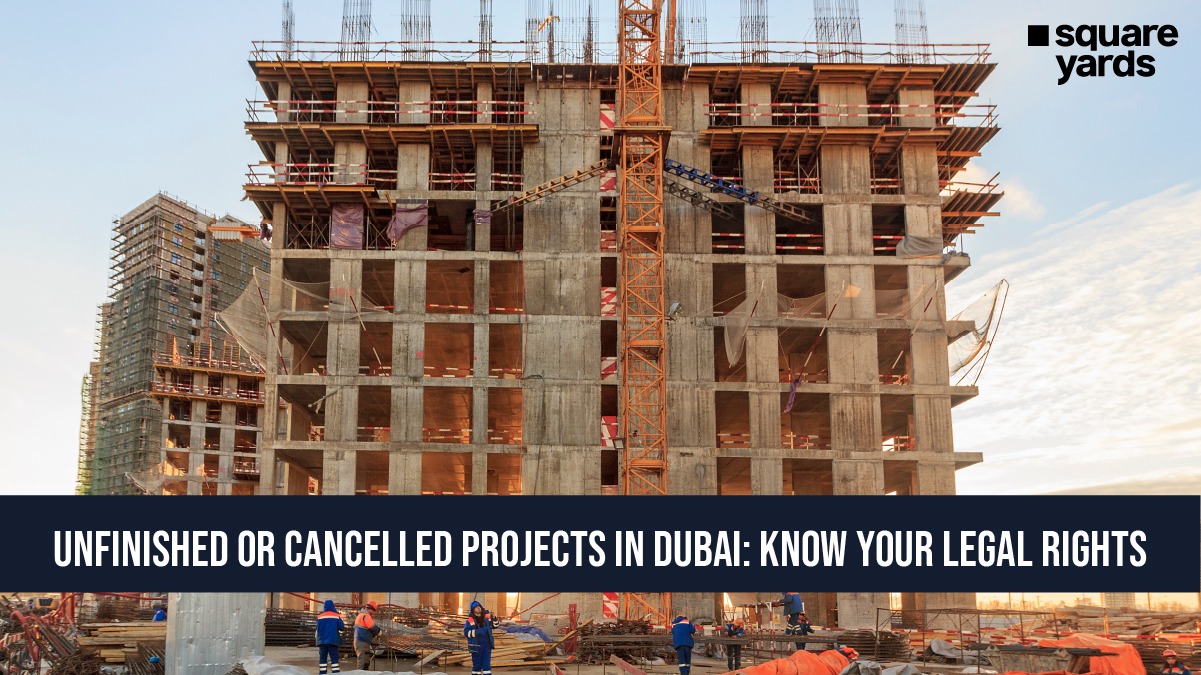The real estate market in Dubai is immensely popular among investors, particularly for off-plan properties. These are properties that buyers purchase before completion, often at lower prices, expecting their value to rise once construction finishes. However, not all off-plan projects reach completion. In some cases, they may face significant delays or even cancellations, leading to financial losses for investors. To tackle these challenges, the Dubai government has established a comprehensive set of Dubai property laws aimed at protecting buyers and ensuring transparency within the market. This blog explores the key element of Dubai Property Laws, particularly focusing on the new regulations surrounding cancelled and unfinished projects.
Understanding the New Dubai Property Laws

-
Overview of the Regulations
In response to concerns regarding unfinished and cancelled real estate projects, the Dubai government introduced Decree No. (33) of 2020. This decree amends previous regulations, specifically the earlier Decree No. (21) of 2013, which outlined rules for cancelled projects in Dubai. The recent changes aim to enhance the effectiveness of existing laws and provide clearer guidance on handling these situations under Dubai Property Laws.
-
Purpose and Objectives of Dubai Property Laws
The primary purpose of Dubai Property Laws is to protect investors’ rights while promoting developer accountability. The regulations aim to restore confidence in the Dubai property market by establishing a clear framework. This is crucial for maintaining Dubai’s status as a top investment destination, especially for international investors looking to tap into the region’s booming real estate sector.
-
Key Amendments to Dubai Property Laws
Several key amendments were introduced with the new regulations:
- Formation of a Special Tribunal: The Dubai government established a new Special Tribunal for the Liquidation of Cancelled Real Property Projects. This tribunal oversees the liquidation process for RERA Dubai’s cancelled projects and ensures investor rights are upheld.
- Refund Requirements: Developers who fail to initiate projects for unforeseen reasons must refund the entire amount paid by purchasers. This amendment applies to projects canceled by RERA Dubai as well.
- Streamlined Dispute Resolution: The new laws introduce a more efficient mechanism for resolving Dubai real estate disputes related to unfinished or cancelled projects, making it easier for affected parties to seek redress.
Dubai’s New Laws for Canceled Projects

These laws aim to protect buyers from the repercussions of project cancellations and enhance developer accountability in the real estate sector.
-
Amendment Regarding Interim Real Property Register
One significant aspect of the new laws involves the Interim Real Property Register. The register tracks off-plan projects and provides a framework for managing them. Under the recent amendment, developers must refund all amounts paid by purchasers if they fail to start the project due to reasons beyond their control. This rule protects buyers by ensuring they get their investment back if a project is cancelled, helping mitigate potential financial losses.
-
Buyer’s Default: Consequences and Remedies
Buyers also have responsibilities under these Dubai property laws. If a buyer fails to meet their financial obligations, they may be classified as a defaulter. In such cases, the developer has the right to cancel the Sales and Purchase Agreement (SPA).
The following steps must be taken:
-
- Notification to the Buyer: The developer must inform the buyer of their default status. The buyer is then given 30 days to rectify the situation by paying the outstanding amount.
- Deregistration of SPA: If the buyer fails to comply, the developer can request that the Dubai Land Department (DLD) deregister the SPA.
- Sale of Property: The property may then be sold to recover the outstanding amount. If the buyer has paid more than 40% of the purchase price, the developer can retain 60% to 80% of the amount paid and return the excess.
- Breach of Contract: If the buyer has paid less than 60%, the developer may retain 25% of the total amount. If no construction has started, the developer can hold 30% of what has been paid. Buyers can seek legal recourse if they believe the developer has breached the contract.
-
Developer’s Default: Remedies & Financial Liabilities Under Dubai Property Laws
Just as buyers have obligations, developers must also fulfill their responsibilities under Dubai real estate laws and regulations. If a developer fails to complete a project on time without a valid reason, such as unforeseen circumstances, the law deems the developer in default.
Under Law No. 19 of 2017, buyers can take legal action if they experience unreasonable delays. They may refer to such delays as Force Majeure and claim compensation from the developer.
In addition, if the developer delays a project due to unexplained reasons, the Interim Real Estate Register amendment stipulates that they must refund the total amount paid by the buyer. This law applies equally if RERA cancels the project.
New Rules for Unfinished Projects Under Dubai Property Laws
-
Completion Deadlines and Penalties For Developers
The new regulations specify clear completion deadlines for developers. If developers do not meet these deadlines, they may face penalties. This provision aims to expedite project completion and reduce the number of unfinished properties in Dubai.
If a developer fails to meet the established timeline, the tribunal can intervene to impose penalties or even force the developer to refund buyers. This aspect of the law encourages developers to maintain a steady pace in project completion.
-
Developer Obligations Under Dubai Property Laws
Under the new laws, developers have specific obligations that must be adhered to throughout the construction process. They are required to:
- Provide regular updates to buyers regarding project progress.
- Adhere to approved construction schedules.
- Ensure that projects meet safety and quality standards.
By enforcing these Dubai property regulations, the government aims to hold developers accountable and foster a culture of transparency in the Dubai property investment sector.
-
Financial Penalties for Developers
In addition to the aforementioned obligations, developers who fail to comply with the new laws may face financial penalties. These penalties deter developers from neglecting their responsibilities and ensure they take their commitments seriously.
Developers who do not adhere to the new Dubai property laws could be liable for compensation claims from buyers. This financial liability further encourages developers to act responsibly and maintain high professionalism.
-
Protection of Buyers’ Rights Under Dubai Property Laws
The protection of buyers’ rights is crucial in the real estate market. It ensures that purchasers are treated fairly and can make informed decisions about their investments. Buyers have specific rights designed to safeguard their interests, primarily established by various laws and regulations in real estate transactions.
- Transparency and Disclosure: Buyers are entitled to receive accurate information regarding the property they intend to purchase. This includes details about the property’s title, any encumbrances, and the developer’s credentials. Such transparency helps buyers make informed decisions and reduces the risk of fraud.
- Quality Assurance: Buyers have the right to expect that the property meets agreed-upon specifications and quality standards. Regulatory authorities often require developers to adhere to building codes and safety regulations, providing buyers with recourse in the event of non-compliance.
- Timely Delivery: Developers are obligated to complete projects within specified timelines. If delays occur without valid reasons, buyers can seek remedies, which may include compensation or refunds. Such provisions help ensure that developers remain accountable for their commitments.
- Dispute Resolution: Many jurisdictions provide mechanisms for buyers to resolve disputes with developers. Regulatory bodies often oversee complaint resolution, ensuring that buyers can seek redress for grievances efficiently and effectively.
- Legal Remedies: In cases where buyers’ rights are violated, they may have the option to pursue legal action against the developer. This may include seeking damages for losses incurred due to delays, poor construction quality, or other issues that violate their rights.
Dispute Resolution Mechanisms
In the real estate sector, the importance of efficient dispute-resolution mechanisms cannot be overstated. When conflicts arise between buyers and developers, having established pathways for resolution helps to mitigate frustration and ensure accountability.
-
Role of the Real Estate Regulatory Authority (RERA)
The Real Estate Regulatory Authority (RERA) is a pivotal institutions in protecting buyers’ interests. Its primary role is to enforce compliance with real estate regulations. RERA provides a platform for buyers to lodge complaints against developers who fail to deliver on their contractual obligations. By regulating the market, RERA aims to foster a transparent environment, ensuring that buyers can easily access legal recourse. This includes investigating grievances, mediating disputes, and imposing penalties on developers who violate established laws. Moreover, RERA keeps a public register of developers and their projects, allowing buyers to verify the legitimacy of a developer before making a purchase dispute resolution Options.
-
Alternative Dispute Resolution (ADR) options
Alternative Dispute Resolution (ADR) offers effective methods for resolving conflicts without resorting to lengthy litigation. This includes mediation, where a neutral third party facilitates discussions between the buyer and the developer, and arbitration, where an arbitrator makes binding decisions. These processes can significantly reduce the time and costs associated with traditional court proceedings. Many jurisdictions encourage the use of ADR methods as they foster collaborative resolutions tailored to both parties’ needs, leading to more satisfactory outcomes.
-
Legal Remedies for Affected Buyers
In the real estate sector, legal remedies serve as crucial avenues for buyers adversely affected by a developer’s actions or negligence. Understanding these remedies can empower buyers and help protect their investments. Here are key legal remedies available to affected buyers:
- Compensation Claims: Buyers have the right to claim compensation for losses incurred due to delays, substandard construction, or the developer’s non-fulfillment of contractual obligations. This claim can cover various damages, including financial losses, emotional distress, and additional costs incurred due to the developer’s default.
- Refund of Amounts Paid: Buyers can seek a complete refund of the amounts paid if the developer fails to deliver the property or does not comply with the agreed-upon specifications. This is particularly relevant in cases where the project is cancelled or delayed beyond reasonable limits.
- Specific Performance: Buyers may also seek a legal remedy called specific performance, where they request the court to compel the developer to fulfil the terms of the contract. This is applicable when monetary compensation is inadequate, and the buyer still desires the property.
- Injunctions: Affected buyers can file for an injunction to prevent the developer from taking certain actions, such as selling the property to someone else or making changes that would affect the buyer’s rights. This legal measure can protect the buyer’s interests while the dispute is being resolved.
- Complaint to Regulatory Authorities: Many jurisdictions have established regulatory bodies, such as RERA (Real Estate Regulatory Authority), that oversee real estate transactions. Buyers can lodge complaints with these authorities to seek redress for grievances. These bodies often have the power to impose penalties on developers and facilitate mediation between parties.
- Class Action Lawsuits: In cases where multiple buyers are affected by the same issue (e.g., a developer’s default on a large project), they can band together to file a class action lawsuit. This collective legal action can enhance their negotiating power and streamline the resolution process.
Consumer Rights and Protections
Consumer rights and protections are paramount to ensuring a fair and transparent buyer market. These rights safeguard individuals from misleading practices, ensure access to accurate information, and promote accountability among developers and real estate professionals.
-
Information Disclosure
-
Off-Plan Sales Regulations
Off-plan sales regulations are essential for protecting buyers who invest in properties still under construction.
-
Consumer Complaints and Redress
A robust consumer complaints and redress mechanism is critical for fostering trust and confidence in the real estate market. Regulatory authorities, such as RERA, establish structured channels for buyers to report grievances and seek resolutions. These systems set specified timelines for addressing complaints, ensuring developers respond promptly.
Conclusion
Understanding the mechanisms in place to protect buyers’ rights is essential for effectively managing the real estate market. These protections, including the involvement of regulatory authorities, ADR options, and clear legal remedies, contribute to a more secure environment for buyers. By understanding their rights, consumers can approach real estate transactions confidently, knowing they have the support of established laws and regulations.
Similar Suggestions For You:
|
About Requesting for Temporary Permit Dubai |
|
|
Understand Temporary Housing Benefits in Dubai |
|
|
Explore Dubai Master Plan |
|
|
About Building Completion Certificate in Dubai |
|
|
Guide to Sharing Accommodation in Dubai |
Frequently Asked Questions (FAQ’s)
The new laws provide a structured framework for managing Cancelled projects Dubai and outline rights for buyers and obligations for developers. Key provisions include the establishment of a Special Tribunal, refund requirements, and a streamlined dispute resolution process.
The latest changes were introduced through Decree No. (33) of 2020, amending previous regulations and setting new standards for project management and buyer protection.
Significant changes include the formation of a Special Tribunal for the Liquidation of Cancelled Real Property Projects, strict refund requirements for developers, and improved dispute resolution mechanisms for unfinished projects.
If a developer fails to meet established deadlines without valid reasons, they may face penalties. Buyers are entitled to seek refunds or compensation, and the tribunal has the authority to enforce these measures, enhancing Dubai property laws' compliance.
Yes, buyers can seek contract cancellation and refunds if the developer fails to fulfil its contractual obligations. Buyers have the right to legal recourse in such cases.
RERA Dubai cancelled projects oversight includes monitoring project compliance, assisting in dispute resolution, and ensuring that developers meet their legal obligations. RERA works to protect buyer interests by enforcing Dubai property regulations.
Yes, the new laws encourage ADR methods, such as mediation and arbitration, offering a more cost-effective and efficient path to dispute resolution without involving lengthy court proceedings.
By establishing refund requirements, strict deadlines, and legal remedies, the new Dubai property investment laws offer comprehensive protection for buyers, reducing the risk of financial losses from unfinished or cancelled projects. What are the new laws for unfinished and cancelled projects in Dubai?
When were these new laws implemented?
What are the main changes introduced by these laws?
What happens if a developer fails to complete a project on time?
Can buyers cancel their contracts for unfinished projects?
What is the role of RERA in overseeing unfinished projects?
Are there any Alternative Dispute Resolution (ADR) options available?
How does the law protect buyers' investments?




